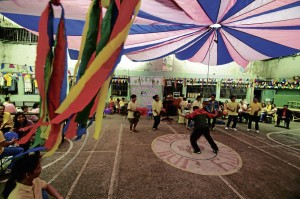Christmas story: ‘We felt free, even just for a moment’

BUREAU of Jail and Management Penology inmates (all wearing yellow shirts) dance with their gongs at the tented open court of the prison building in Baguio City on Dec. 21 as they celebrate Christmas with their visiting friends and families. Richard Balonglong/INQUIRER NORTHERN LUZON
BAGUIO CITY—“For the moment, I feel free. It’s one of those days that you look forward to, being with family in gatherings like this. I don’t celebrate Christmas, [but] this is still worth it.”
That was the sentiment of 38-year-old David when he and other inmates gathered at the Baguio City jail quadrangle on Dec. 21 to celebrate Christmas with the abandoned and detainees of different faiths.
David, a member of the Iglesia ni Kristo, has been encouraged to join a “nonaffiliated organization (NAO)” party, which has been running on for five years for inmates which have no gang affiliations.
Gang members in the jailhouse held their separate Christmas parties, scheduled one after the other.
George de la Cruz, the group’s leader, said they gather inmates from diverse cultural and religious backgrounds, as well as those who have not been visited by their relatives or friends since their incarceration.
Article continues after this advertisementDe la Cruz initially proposed to organize a foster-parenting program for about 30 inmates, but lackluster response prompted him and several Baguio residents to design a “barkadahan (peer-group)” network instead.
Article continues after this advertisementThe primary goal of NAO, formed in 2008, is to provide a support system to inmates who have no gang affiliation but who seek moral, spiritual or financial support from peers.
Last week, the jailhouse was filled with merrymaking. The inmates with no gang membership feasted on pancit palabok, kare-kare and chicken stew over cupfuls of rice.
“This Christmas party brings a lot happiness to inmates. It helps beat boredom and sadness. You have no idea what sadness can do to people like us. That’s why we always look forward to this event because it’s only once a year. It’s hard to get over the year without [a Christmas party]. This one gives us peace of mind and heart and we are thankful for this,” David said.
De la Cruz said NAO has 97 members out of about 500 inmates. Many of them are either serving short sentences or are detained while they undergo trial.
“This is like foster parenting of sorts. We attend to their needs—from the emotional to the psychological. They sometimes need to express something but they could not share with the warden out of shyness,” he said.